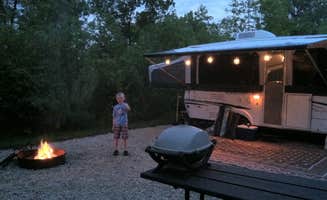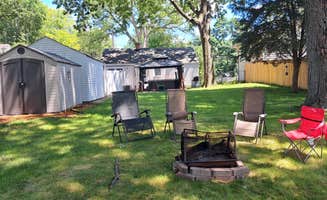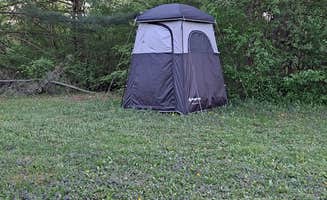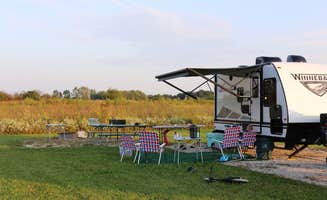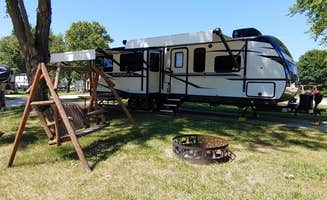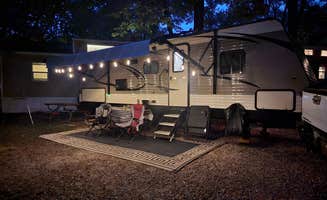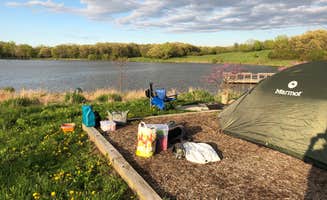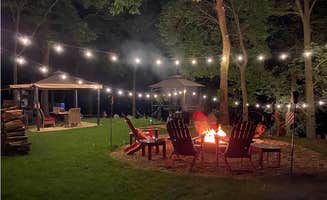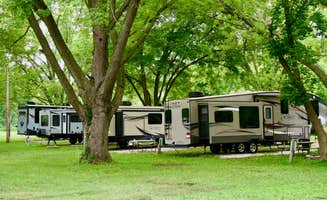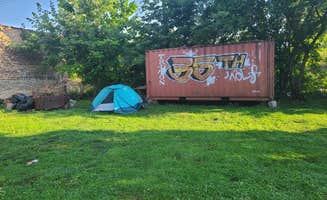Camping spots near Bartlett, Illinois feature a mix of prairie landscapes, wooded areas, and suburban proximity, with most facilities sitting at elevations between 700-800 feet. The region experiences high humidity from June through August with average temperatures of 85-90°F, while spring and fall camping seasons typically offer more moderate temperatures in the 60-70°F range. Summer thunderstorms can develop quickly across the open terrain with limited natural shelter at many campgrounds.
What to do
Hiking varied terrain: At Camp Reinberg in Palatine, the trail system offers diverse ecosystems within walking distance of campsites. "The trails through the grounds are varied and long—you can find something to suit just about any preference for suburban midwest hiking. There are plenty of paved trails as well as dirt, lots of fun little off-shoots into the woods, creeks run throughout, and there's even a little up-and-down thanks to ice age glaciers," notes one visitor.
Fishing opportunities: Multiple lakes across various preserves provide fishing options without requiring a boat. At Illinois Beach State Park, campers can access both lake and shore fishing. "There are plenty of places along the lake and ponds to get an easy catch and release," writes one reviewer about the Blackwell area fishing spots.
Biking access: The extensive trail network throughout Kane and DuPage counties connects many campgrounds. "The mountain bike trails were awesome. If you're a trail rider, you must stay here. We saw several vehicles carrying top of the line bikes in and out all day," explains a visitor to Camp Bullfrog Lake, highlighting the popularity of these trails with serious cyclists.
What campers like
Clean facilities: Many county-managed sites maintain excellent bathroom and shower facilities despite high usage. At Camp Bullfrog Lake, "Bathroom/shower facilities were clean and well stocked," according to a recent visitor. Another camper notes Camp Reinberg has "seriously the cleanest [restrooms] I've ever seen, even the ceilings were cleaned!"
Lake activities: Several campgrounds offer water recreation beyond just fishing. "We kayaked in the lake and it's small but nice. Great for kids lots of activities and space to play," writes a visitor to Fish Lake Beach Camping Resort. This resort also features "a beach area for the kids to go swimming" according to another review.
Accessibility to Chicago: Most campgrounds provide a quick escape from urban areas without long travel times. "Only 30 miles outside the city, and conveniently only 10 mins from my house, this is the perfect little getaway," writes one reviewer about a local preserve. Another notes, "For nature that's close to civilization, Deer Grove Forest Preserve is the best."
What you should know
Site privacy varies significantly: While some campgrounds offer wooded separation, others have open layouts. At Big Rock Campground, "Nice campground with big, level sites... Lovely grasslands, ponds, hiking trails, but the lack of trees and privacy isn't my preference," explains one camper, contrasting with more wooded options elsewhere.
Reservation systems: Most county facilities use online reservation systems with different pricing structures for county residents versus non-residents. "Prices are a bit steep if you are from out of the county. We were hoping to camp at the primitive sites but they are walk-in only," notes a visitor to Paul Wolff Campground.
Weather considerations: Summer heat without shade can be challenging at newer sites. "No shade in the Illinois heat and no shower made it unacceptable," cautions a visitor specifically about Big Rock Campground, while others note the lack of mature trees at newer facilities.
Tips for camping with families
Kid-friendly activities: Several campgrounds offer structured programming for younger visitors. "Lots of biking and walking trails and plenty of off trail paths that lead to unique clearings, bridges, etc," writes a visitor to Camp Reinberg. Another camper at Sycamore RV Resort mentions "Great fishing and nice beach for swimming" that appeals to families.
Cabin options: For families new to camping or dealing with unpredictable weather, several preserves offer cabin alternatives. "They have cabins as an option too," notes a Camp Reinberg visitor, while another mentions, "There are small and medium cabins, some heated with their own bathrooms, that feature bunk beds and are great for getting out of the cold."
Noise levels: Campgrounds vary in evening quiet enforcement, an important consideration for families with young children. "It is a super clean campground with multiple hosts and forest preserve staff," reports a camper, indicating good oversight, while another notes, "But very quiet and relaxing by nighttime" at Fish Lake Beach Camping Resort.
Tips from RVers
Hookup availability: Electric service is standard at most sites, but water and sewer connections vary by campground. At Paul Wolff Campground, "There is water and electric And a dump stations at the entrance/exit," but some sites require extensive hose length for water connections. "The staff has to hook up a very very long hose and will bring it to your site. You can get water, it's just an inconvenience for you and them."
Site dimensions: Most campgrounds can accommodate larger rigs, but positioning can be challenging at some locations. "Very easy in and out, for any sized rig," notes one RVer, while another mentions, "Our rig wasn't allowed" at certain primitive sites, indicating the importance of verifying access before arrival.
Leveling considerations: Site preparation varies between campgrounds, with some offering more developed pads than others. "The sites are crushed limestone and are level and wooded," notes a reviewer about one location, while another mentions, "Campground is very well maintained with gravel pads."


